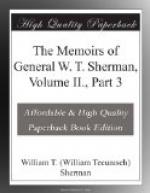I ordered General Thomas to detach two brigades of Garrard’s division of cavalry from the left to the right rear, to act as a reserve in support of General Kilpatrick. Meantime, also, the utmost activity was ordered along our whole front by the infantry and artillery. Kilpatrick got off during the night of the 18th, and returned to us on the 22d, having made the complete circuit of Atlanta. He reported that he had destroyed three miles of the railroad about Jonesboro, which he reckoned would take ten days to repair; that he had encountered a division of infantry and a brigade of cavalry (Ross’s); that he had captured a battery and destroyed three of its guns, bringing one in as a trophy, and he also brought in three battle-flags and seventy prisoners. On the 23d, however, we saw trains coming into Atlanta from the south, when I became more than ever convinced that cavalry could not or would not work hard enough to disable a railroad properly, and therefore resolved at once to proceed to the execution of my original plan. Meantime, the damage done to our own railroad and telegraph by Wheeler, about Resaca and Dalton, had been repaired, and Wheeler himself was too far away to be of any service to his own army, and where he could not do us much harm, viz., up about the Hiawaesee. On the 24th I rode down to the Chattahoochee bridge, to see in person that it could be properly defended by the single corps proposed to be left there for that purpose, and found that the rebel works, which had been built by Johnston to resist us, could be easily utilized against themselves; and on returning to my camp, at that same evening, I telegraphed to General Halleck as follows:
Heavy fires in Atlanta all day, caused by our artillery. I will be all ready, and will commence the movement around Atlanta by the south, tomorrow night, and for some time you will hear little of us. I will keep open a courier line back to the Chattahoochee bridge, by way of Sandtown. The Twentieth Corps will hold the railroad-bridge, and I will move with the balance of the army, provisioned for twenty days.
Meantime General Dodge (commanding the Sixteenth Corps) had been wounded in the forehead, had gone to the rear, and his two divisions were distributed to the Fifteenth and Seventeenth Corps. The real movement commenced on the 25th, at night. The Twentieth Corps drew back and took post at the railroad-bridge, and the Fourth Corps (Stanley) moved to his right rear, closing up with the Fourteenth Corps (Jeff. C. Davis) near Utoy Creek; at the same time Garrard’s cavalry, leaving their horses out of sight, occupied the vacant trenches, so that the enemy did not detect the change at all. The next night (26th) the Fifteenth and Seventeenth Corps, composing the Army of the Tennessee (Howard), drew out of their trenches, made a wide circuit, and came up on the extreme right of the Fourth and Fourteenth Corps of the Army of the Cumberland (Thomas) along Utoy Creek, facing south.




